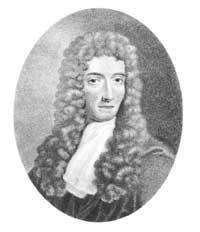Robert Boyle
Elhuyar Fundazioa
British physicist and chemist was born on 25 January 1627 at the Lismore Castle in Ireland, in Waterford County. He is the fourteenth son of the count of Corck, and from a very young age he excelled in science.
He was sent to the school of Eton in 1635 and toured Europe between 1639 and 1644. At the age of fourteen in Italy he studied the works of Galileo, who recently died. He was a good religious Anglican during his life for having entered fear into a storm when he was in genoa.
Back home in 1645, Francis Bacon met with the Savvy to discuss fashion experimentation. In 1663, when Charles II became king, he founded the prestigious Royal Society.
In 1657, knowing Guericke's tests, he tried to make a vacuum pump. With the help of Robert Hooke he got the target and after making vacuum in a tube he introduced objects of different weight. He showed that all objects fall into the void at the same speed, proving Galileo's hypothesis.

In 1662 he showed that air compressibility was inversely proportional to the pressure applied to it. This is what is known as the Boyle-Mariotte law. The main conclusion was that, being compressible air, it should be composed of small particles dispersed in the vacuum. In compression, therefore, these particles were united. Atomism began to take hold after two thousand years after Democritus expressed it.
Boyle also worked in alchemy. He believed in the transmutation of gold and in 1689 asked the government to eliminate the law prohibiting the manufacture of gold. With the gold that was created the government believed that it should be used and that the scientist had to push to make gold. However, Boyle in 1661 converted alchemy into chemistry with the publication of the book Skeptical Chemist. He abandoned the Greek theory that the elements were composed of mystical substances. For Boyle the element was a material substance identifiable by analytical methods. The element was any substance that could not be separated into two other simpler ones.
In 1680 he isolated the phosphorus element from the urine, but Brand was ahead of five or ten years because the finding was silent.
Religious love grew over time in Boyle. He ran with the costs of writing religious essays and sending missionaries to the East.
In 1680 he was appointed president of the Royal Society, but resigned from his position for disagreement with the oath system.
He died on 30 December 1691 in London.





